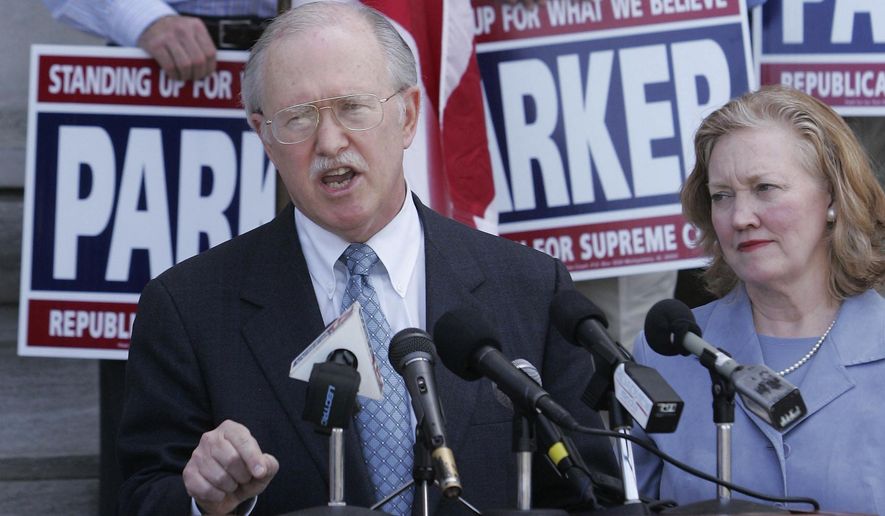MONTGOMERY, Ala. (AP) - Alabama’s Roy Moore fell short in his quest to become a U.S. senator, but voters this November could install one of his longtime allies as the state’s chief justice.
Associate Justice Tom Parker says in a campaign ad that he won’t “sit back while liberals destroy our law and liberty.” Like Moore, he sees Alabama’s courts as a key battleground for overturning U.S. Supreme Court decisions that legalized abortion and same-sex marriage.
“President Trump is just one conservative appointment away from giving us a conservative majority on the U.S. Supreme Court and they are going to need cases that they can use to reverse some of those horrible decisions of the liberal majority from the past that have no constitutional foundation whatsoever,” Parker told The Associated Press in an interview.
Parker’s rallying cries to social conservatives propelled his primary win over a rival he dismissed as too “moderate:” Chief Justice Lyn Stuart, a better-funded incumbent who had taken over chief justice duties after Moore was suspended from the bench for a second time.
Now he faces Bob Vance, a county circuit judge who would become the only Democrat on the Alabama Supreme Court.
The race has undertones of a rematch. It was Vance’s strong showing against Moore in the 2012 race for chief justice - he lost by just 62,000 votes with support from moderate Republicans - that helped inspire U.S. Sen. Doug Jones last year in his defeat of Moore for the seat vacated by Attorney General Jeff Sessions.
After years of upheaval - no chief justice has completed the six-year term since 2001 - both Parker and Vance emphasize the need to address systemic funding and staffing shortages. Parker says he would draw on his lobbying experience to secure funding. Vance said judges are “grappling every day” with defendants plagued by addiction and mental health issues.
Vance, 57, a graduate of Princeton University and the University of Virginia law school, has been elected three times since his appointment in Jefferson County in 2002. He says Moore was a “divisive” justice, and he fears more of the same if Parker takes charge.
“The chief justice really should stand there for everyone, because the courts should be there for everyone,” Vance told the AP.
Vance says personal ideologies have no place in the judiciary.
He cites his father - federal appellate Judge Robert Smith Vance Sr., who was assassinated with a mail bomb in 1989 - who said his religious opposition to the death penalty couldn’t influence his legal decisions.
“He emphasized to me that if you do your job as a judge, and do it well, you’ve got to put aside your personal beliefs sometimes and just stick with what the law tells you to do,” Vance said.
Parker, 66, graduated from Dartmouth College and Vanderbilt University law school, then worked as an assistant attorney general and director of a conservative think tank tied to James Dobson’s Focus on the Family. Moore hired him as deputy administrative director of courts, and he served as Moore’s spokesman during fights over a Ten Commandments monument Moore erected in the state Supreme Court building.
Those court fights ended in 2003 with Moore’s first ouster from the bench. Parker was elected as justice the next year, and Moore was re-elected chief justice in 2012.
Bill Stewart, a political scientist and long-time observer of state politics, said Parker could be viewed as “Moore- light.” He hasn’t been directly involved in Parker’s campaign. But neither has Parker sought to put any distance between him and Moore.
Parker contends Moore was wrongfully suspended in 2016, after an ethics panel ruled he was urging probate judges to defy the Supreme Court’s legalization of same-sex marriage. He says Moore was treated unfairly because of his Ten Commandments fight.
Moore remains embroiled in defamation lawsuits over the allegations of sexual misconduct with teens decades ago that doomed his Senate race.
In 2014, they were the lone voices against a 7-2 ruling denying a “birther conspiracy” effort that had sought to keep President Barack Obama’s name off Alabama’s 2012 ballot. Parker wrote that the state had “received notice sufficient to raise a duty to investigate” Obama’s qualifications. Parker says now that he wasn’t commenting on the “truth” of the accusation.
But Parker is not just Moore’s judicial acolyte. He has now been on the state Supreme Court twice as long as his former boss. And while Moore was twice ousted for violating judicial ethics, Parker cites his defeat of an ethics complaint as a victory for free speech.
The Southern Poverty Law Center had complained about comments Parker made on a Christian radio show criticizing the U.S. Supreme Court’s gay marriage ruling. The same group had criticized him a decade earlier for posing with rebel battle flags alongside white extremists at the funeral of a Confederate widow; Parker said at the time that he had only just met the men, and that the criticism from a group like the SPLC showed he “must be doing the right things.”
The complaint about his radio comments was dismissed, but Parker kept fighting until the Judicial Inquiry Commission agreed not to enforce the rule against off-the-bench comments unless they impact the fairness of impending proceedings.
A Parker campaign ad says he’s “unafraid to stand up to bullies like the SPLC in defense of our Judeo-Christian heritage.” He told the AP that the victory allows judges to speak their minds and voters to learn the positions of “the judicial candidates that they are voting on.”




Please read our comment policy before commenting.